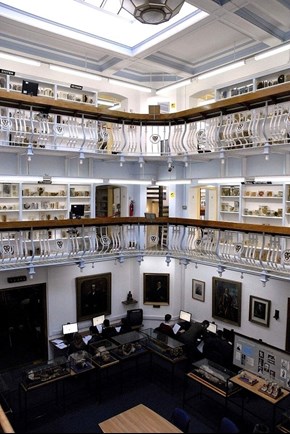Recognising Systemic Conditions Associated with Audiovestibular Dysfunction for the Practising Clinician
 Lara Carvalho Sauer, ST5 Audiovestibular medicine trainee,
Lara Carvalho Sauer, ST5 Audiovestibular medicine trainee,
Balance team at ENT Department, Guy's and St Thomas' NHS Foundation Trust
The 66th Hallpike Symposium was organised by Drs Carolyn Ainsworth and Rosa Crunkhorn, Audiovestibular Medicine (AVM) Consultants at Guy’s and St Thomas’ NHS Foundation Trust, London. The venue, the Gordon Museum, within Guy’s campus of King’s College London, is one of the largest medical museums in the UK and is not typically open to the general public. It houses a collection of over 8000 historical specimens, detailed dermatological wax models and striking paintings of real patients with pre-operative tumours.

Gordon Museum, KCL
The theme of the event was ‘Recognising systemic conditions associated with audiovestibular dysfunction for the practicing clinician’. It was attended by a total of 54 physicians (31 virtual and 23 in person), a mix of consultants (AVM and other specialties) and AVM residents.
Paediatric Neurologist Dr Ming Lim kicked off the day with a summary of demyelination disorders in children, explaining how hearing loss can be a red flag in those with relapsing neurological symptoms. About 11% of patients with demyelination may present with hearing loss either on presentation or as a second episode after an acute neurological event. Neurologist Dr Shazia Afridi has a specialist interest in neurofibromatosis and highlighted the recent change in nomenclature from Neurofibromatosis type 2 to NF2-related schwannomatosis. She mentioned that 15% of these patients present to emergency clinics with sudden hearing loss responsive to steroids and that contrast-enhanced MRI scan of the inner ears and head are particularly helpful for the identification of vestibular schwannomas. Consultant Neurologist Dr Arti Mahto discussed autoimmune-related hearing loss, which is rare and still poorly understood. In cases of suspected autoimmune ear disease, key questions and specific immunological testing can be helpful to point towards an underlying associated autoimmune condition. Multidisciplinary discussion is vital for appropriate diagnosis and treatment, with hope of better patient outcomes.
After lunch, Neurologist Dr Alexander Rossor covered nutritional neuropathies and Strachan’s Syndrome, which has been increasing in prevalence in the UK due to increased uptake of bariatric surgery, restricted diets and veganism. Special attention was given to thiamine deficiency causing acute vestibular syndrome and the association between vitamin B12 and Riboflavin deficiencies and auditory neuropathy. Professor Rohani Omar, Audiovestibular Medicine Consultant, addressed the importance of assessing memory with simple tests, such as the Montreal Cognitive Assessment (MoCA), in clinic for older patients attending for hearing assessments, in view of the known association of hearing loss and dementia. Paediatric Metabolic Medicine Consultant Dr Rebecca Halligan talked about Paediatric Mitochondrial Disease. About 40% of patients with mitochondrial disease have hearing loss, which tends to be bilateral and progressive. Recently, extra relevant mitochondrial genes were added to the R65 hearing loss gene panel.
The symposium was hugely informative, bringing our attention to various systemic medical conditions should be borne in mind when seeing patients who present with hearing loss, auditory neuropathy and dizziness. A personal highlight was the excellent networking opportunities available on the day. The need to assess our patients holistically, and with multidisciplinary input, were the take home messages from this symposium. Having attended this event, I am confident that this would translate to improved patient care as we continue to develop our knowledge in these areas, whilst working closely with specialities allied to audiovestibular medicine.
This event happens yearly in November and is advertised through the BAAP website: https://www.baap.org.uk



